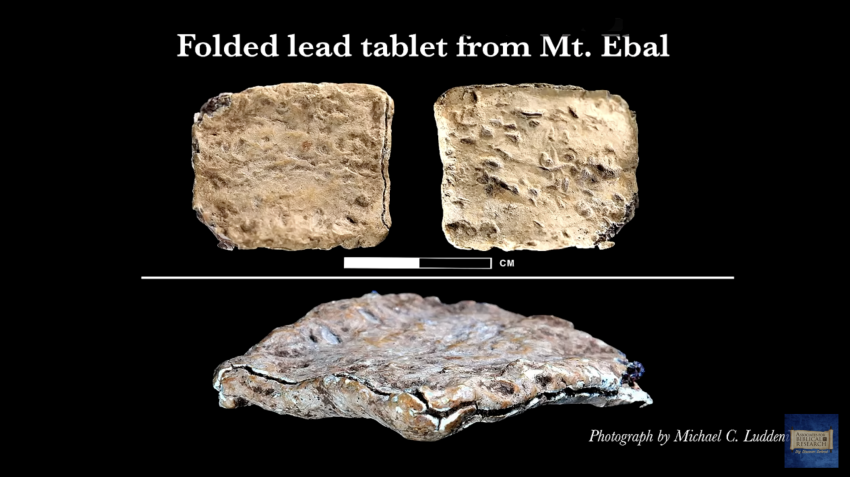Bible researchers decipher earliest Hebrew inscription known as ‘curse tablet’
The inscription is also the earliest mention of the name of God, archaeologist claims

Biblical researchers say they have decoded an ancient Hebrew inscription, known as a “curse tablet” that predates by centuries any known Hebrew inscription from ancient Israel. The inscription was found on Mt. Ebal, the mountain of the curse, mentioned in Deuteronomy 27 and Joshua 8.
“Cursed, cursed, cursed — cursed by the God of YHWH, you will die cursed, cursed you will surely die, cursed by YHWH cursed, cursed, cursed,” reads the earliest proto-alphabetic Hebrew text recovered on a small, folded lead tablet, the Associates for Biblical Research announced at a press conference at the Lanier Theological Library in Houston, Texas, on Thursday.
“I believe the amulet dates to the Late Bronze II age, or as early as 1400 BC,” Scott Stripling, ABR’s director of excavations, told The Jerusalem Post.
He added, “This is earlier than many skeptics believe the Bible existed, making this the earliest appearance of the word YHWH in Israel and it was found at a covenant site. The implications are enormous and will reverberate for many years to come.”
The amulet, known as a defixio or curse tablet, came to light in December 2019 when Stripling, also the director of the Archaeological Studies Institute at the Bible Seminary went with his team to wet sift the discarded material from excavations conducted in 1982-1989 in the West Bank
Those excavations were conducted by the late Haifa University archaeology professor Adam Zertal who discovered the altar of Joshua on Mount Ebal near the city of Nablus in the West Bank.
“This amulet and its inscription do not predate the Bible,” Stripling said. “We believe it coincides with the biblical events. We talk about verisimilitude, a consistency between what we read in the text and what we find in the material culture. If the text were true, this is what you would anticipate finding, and indeed, it is what we found.”
Haifa University professor Gershon Galil told The Times of Israel, “This is a text you find only every 1,000 years.”
Some have raised concerns about the claims, with one unnamed academic telling The Times of Israel, “The fact that they are publishing it in the news before being published scientifically is a bit off."
The Associates for Biblical Research said an academic, peer-reviewed article will be published later this year. The researchers include: Stripling, Galil, Ivana Kumpova, Jaroslav Valach, Pieter Gert van der Veen, Daniel Vavrik and Michal Vopalensky.
According to the Bible, Mount Ebal was the mountain from which the curses were called out for those who broke God’s law when the children of Israel made a covenant with God before entering the land of Israel.
Deuteronomy 11:29 reads, “When the Lord your God has brought you into the land you are entering to possess, you are to proclaim on Mount Gerizim the blessings, and on Mount Ebal the curses.”



























